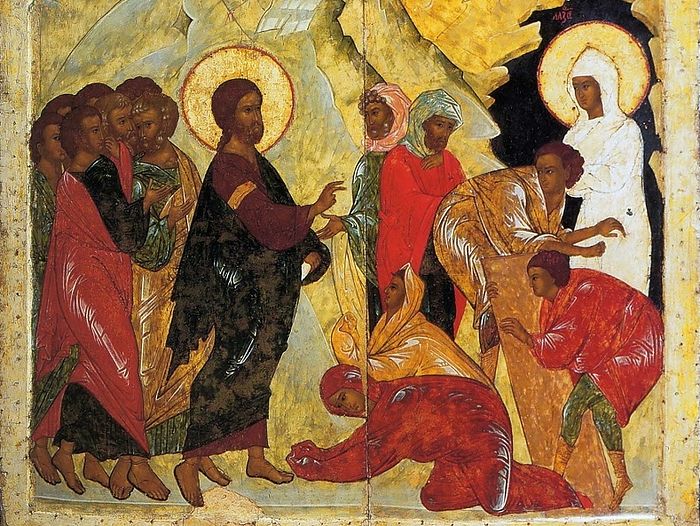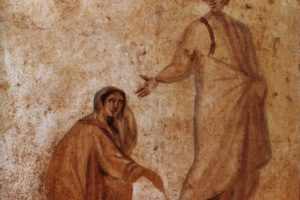Blogs exist not merely to proclaim truth (for that we have the pulpit), nor do they exist strictly for academic discovery (as in journals and monographs). The Blogosphere is a happy dimension where ideas can be tested or even just simply suggested. It is the tentative nature of Blogs that allow me the opportunity to be a bit more risky and provocative than I would normally prefer. Naturally, this post will see opposition, but consider my thoughts for a moment. I’d like to suggest that Lazarus wrote the Gospel of John.
At first, I should note that my arguments for this are strictly literary. I will not address the Church tradition regarding Apostolic authorship, nor the historical issues regarding John the Elder (see Richard Bauckham, Jesus and the Eyewitnesses). I should also note that I have never read Ben Witherington’s arguments in favor of a similar position (as I’ve been told). What proceeds here is strictly literary, and as I’ve said before, if I only have the Fourth Gospel and nothing else, these arguments are fairly compelling (at least to me).
Another preliminary comment, one should not consider this view either liberal or heretical. For one, the Gospel of John is anonymous (like the rest of the Gospels and the Letter to the Hebrews). Speculation regarding authorship of these writings is not the same as speculation on the authorship of epistles attributed to an author in the text itself (such as the epistles of Paul, Peter, etc). Secondly, the suggestion being made here is that a dead man wrote the Fourth Gospel. In case you’re ready to cry foul, nothing is more conservative than to suggest that a dead man wrote a book!
Now, I have three arguments that compel me to at least re-think the authorship of the Fourth Gospel on internal grounds. I will address them in the order of what I consider to be least speculative to most speculative.
The most compelling argument for me is based on the literary character of the Beloved Disciple. Since the narrative does not tell us explicitly who this person is, the question of his (her?) identity is open for discussion. Thus, if we follow the narrative we will notice some interesting things. Most intriguing is the fact that the character of the Beloved Disciple is not introduced until after the Lazarus narrative in John 11. When one looks closely at that chapter it is clear that Jesus exudes the most amount of emotion and pathos in the entire Gospel. Jesus is told of Lazarus’ demise by Mary and Martha with the statement, “the one whom you love is sick” (Jn 11.3). The narrator then quickly reminds the reader that Jesus loved Mary, her sister, and Lazarus (Jn 11.5). Jesus refers to Lazarus as “our friend” (Jn 11.5). When Jesus saw Lazarus’ sisters and the surrounding Jews weeping he was deeply disturbed (Jn 11.33) and then wept (Jn 11.35). While weeping the crowd exclaimed, “See how he loved him” (Jn 11.36). Before raising Lazarus from the dead, the text notes again that Jesus was ‘deeply moved’ (Jn 11.38). Now after this scene in the narrative we find the first reference to the Beloved Disciple in Jn 13.23. From a narratival standpoint, does it make more sense to use a title like “the Beloved Disciple” as a circumlocution for a character already introduced into the narrative or to a brand new character? Chapter 11 presents us with a disciple whom Jesus loved, and it makes good sense that as the designation “the Beloved Disciple” is a reference to a character that the reader has already found Jesus to love dearly: Lazarus.
The second argument relates to the epilogue of the Gospel. After Peter was told how he was to die (Jn 21.18-19), he then pointed the finger at the Beloved Disciple and asked, “What about him?” Jesus essentially replied that his death was not important for Peter since his concern was to follow the Lord. Then the text tells us that a rumor spread that the Beloved Disciple would not taste death (Jn 21.23). Think about this for a moment. Why would a rumor like this spread? To my mind, it would make more sense if this rumor spread about someone who had already died. Certainly the disciples would have been confused about the differences between resuscitation and resurrection. Since Lazarus has already died will he die again? This would have naturally led to the kind of rumor we see here at the end of the narrative.
The third argument (and admittedly the most speculative) relates to the description of Peter and the Beloved Disciple racing to the tomb on Resurrection Sunday. We are told that the Beloved Disciple reached the tomb first, but did not enter the tomb right away. Peter entered first, and then the Beloved Disciple entered. My question about this scene is: why the details about racing and stopping and entering? Suggestions have been made (though equally speculative) that this scene shows us that the Beloved Disciple was younger than Peter (hence faster), or that Peter held authority (really? one needs authority to enter the tomb?). Yet, I want to suggest that the Beloved Disciple hesitated in entering because he did not want to go back into a tomb. Call me fanciful, but why else narrate this scene as such?
Of course, stepping away from tradition is difficult. Thus, I only suggest this tentatively. The best argument I’ve received against this position (over a delicious lunch of all you can eat Chinese food with Darrell Bock) is that the Synoptic tradition records that only the twelve disciples were present in the upper room. That’s a good argument, but again, my concern is with the internal narrative of the Fourth Gospel so it does not ultimately persuade me (although it probably should). It is also tough to consider that the Apostle John, one of the three pillars of the early church (Gal 2.9), would not have contributed to a Gospel in some way. Some suggest on the basis of anonymity that John must be the author (since the other Apostles are named). However, reference is made to the ‘sons of Zebedee’ in Jn 21.2 so there isn’t true anonymity if John wrote it (and this argument couldn’t rule out James!). Furthermore, it is curious why John the Baptist is referred to simply as ‘John’ in this Gospel and never as ‘John the Baptist’ (Jn 1.6, 15, 19, 26, 32, 35, 40; 3.23, 24, 25, 26, 27). This is all the more striking if the author of this Gospel was also named John. One might expect a title like ‘the Baptist’ for the sake of clarity (not to mention the Gospel tradition). What’s more, where are the key events from the Synoptics that the Apostle John experienced, like the Transfiguration? Wouldn’t such an event fit the author’s emphasis on the glory of Christ quite nicely? Perhaps the author of this Gospel was not present at that event? Perhaps Lazarus’ authorship might be the key to many of the divergences between the Fourth Gospel and the Synoptics?
By way of ending this discussion, I’d like to suggest ways to move forward with this issue. It is possible, that although the Beloved Disciple could be Lazarus, the Gospel may have been written by someone else. The epilogue of the Gospel appears to connect the author and the Beloved Disciple (Jn 21.24), yet the first person plurals in this verse suggest the presence of a community or other influences behind the author. Perhaps the situation is much like the Gospel of Mark. Peter himself did not write the Gospel, but tradition suggests that he oversaw Mark’s composition. Considering the parallels of language between the Fourth Gospel and the epistles of John (which are attributed to a figure named John), perhaps the Apostle John helped to oversee Lazarus’ composition of the Fourth Gospel?
These are my thoughts on this issue. Now tell me why I’m wrong! : )





31 Comments
Leave your reply.